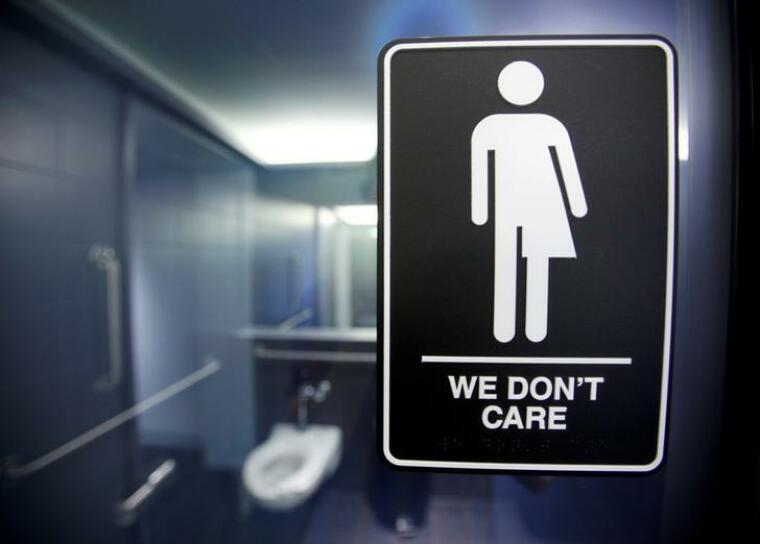ACLU files lawsuit challenging North Carolina's modified 'bathroom bill'

The American Civil Liberties Union (ACLU) has filed a lawsuit against North Carolina's House Bill 142, a legislation that replaced the controversial HB2 bathroom bill.
In the lawsuit filed on Friday, the ACLU argued that the replacement law continues to discriminate against transgender people by leaving restroom policies in the hands of state lawmakers and preventing local governments or schools from setting rules or offering guidance.
"The vacuum purposefully created by H.B. 142 in effect maintains the ban of (the previous law) and encourages discrimination by both government and private entities and individuals," the suit stated, as reported by The Associated Press.
"The law offers no guidance to anyone except by implication and makes it impossible for a reasonable person who is transgender to know which restroom they can legally use," it continued.
HB 142 was approved last March following months of backlash from other states, entertainers and sports teams that refused to participate in events in North Carolina due to HB2, which required transgender to use bathrooms that correspond to the sex on their birth certificate.
The replacement legislation basically revoked the bathroom bill, but it forbids cities and towns from creating ordinances pertaining to bathrooms and changing rooms until 2020.
The ACLU's legal director in North Carolina, Chris Brook, described the replacement law as a "wolf in sheep's clothing."
"It's time to make it clear to anti-LGBT legislators in our state, you haven't pulled the wool over our eyes and we must finally end state permitted discrimination," Brooke said, according to WAVY.
The lawsuit, which is a revamped version of an existing suit that challenged HB2 in federal court, argues that the legislation violates constitutional due process, equal protection rights and federal laws against discrimination in workplaces and schools.
The revamped lawsuit names Gov. Roy Cooper as a defendant and retains the same parties from the previous complaint, with the addition of two new plaintiffs.
The suit noted that one of the plaintiffs, JoaquÃn Carcaño, a 28-year-old transgender man who works for the University of North Carolina, has been unable to get a clarification from his employer on whether he is allowed to use bathrooms consistent with his gender identity since the new law passed.
Since the new legislation went into effect this year, sports leagues such as the NBA, NCAA and ACC stated that they will hold championship events in North Carolina again.
In March, the Associated Press published an analysis indicating that the bathroom bill could cost North Carolina more than $3.76 billion in lost business over 12 years.
 Christians don't have to affirm transgenderism, but they can’t express that view at work: tribunal
Christians don't have to affirm transgenderism, but they can’t express that view at work: tribunal Archaeology discovery: Medieval Christian prayer beads found on Holy Island
Archaeology discovery: Medieval Christian prayer beads found on Holy Island Presbyterian Church in America votes to leave National Association of Evangelicals
Presbyterian Church in America votes to leave National Association of Evangelicals Over 50 killed in 'vile and satanic' attack at Nigerian church on Pentecost Sunday
Over 50 killed in 'vile and satanic' attack at Nigerian church on Pentecost Sunday Ukrainian Orthodox Church severs ties with Moscow over Patriarch Kirill's support for Putin's war
Ukrainian Orthodox Church severs ties with Moscow over Patriarch Kirill's support for Putin's war Islamic State kills 20 Nigerian Christians as revenge for US airstrike
Islamic State kills 20 Nigerian Christians as revenge for US airstrike Man who served 33 years in prison for murder leads inmates to Christ
Man who served 33 years in prison for murder leads inmates to Christ


 Nigerian student beaten to death, body burned over ‘blasphemous’ WhatsApp message
Nigerian student beaten to death, body burned over ‘blasphemous’ WhatsApp message 'A new low': World reacts after Hong Kong arrests 90-year-old Cardinal Joseph Zen
'A new low': World reacts after Hong Kong arrests 90-year-old Cardinal Joseph Zen Iran sentences Christian man to 10 years in prison for hosting house church worship gathering
Iran sentences Christian man to 10 years in prison for hosting house church worship gathering French Guyana: Pastor shot dead, church set on fire after meeting delegation of Evangelicals
French Guyana: Pastor shot dead, church set on fire after meeting delegation of Evangelicals ‘Talking Jesus’ report finds only 6% of UK adults identify as practicing Christians
‘Talking Jesus’ report finds only 6% of UK adults identify as practicing Christians Mission Eurasia ministry center blown up in Ukraine, hundreds of Bibles destroyed: 'God will provide'
Mission Eurasia ministry center blown up in Ukraine, hundreds of Bibles destroyed: 'God will provide' Church holds service for first time after ISIS desecrated it 8 years ago
Church holds service for first time after ISIS desecrated it 8 years ago Burger King apologizes for 'offensive campaign' using Jesus' words at the Last Supper
Burger King apologizes for 'offensive campaign' using Jesus' words at the Last Supper Uganda: Muslims abduct teacher, burn him inside mosque for praying in Christ’s name
Uganda: Muslims abduct teacher, burn him inside mosque for praying in Christ’s name